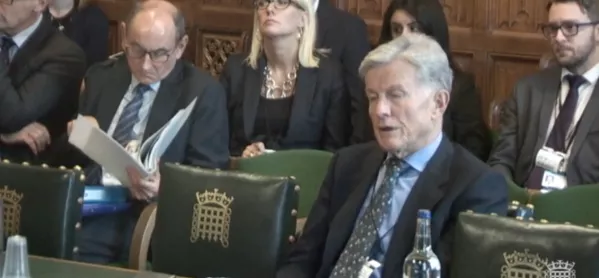The head of the government’s spending watchdog has raised concerns over conflicts of interest within school chains and the oversight of the academies programme as a whole.
Sir Amyas Morse, comptroller and auditor general of the National Audit Office (NAO), told MPs that propriety and conflicts of interest within academies were the “biggest issues” facing the schools.
Speaking to the Commons education select committee, Sir Amyas also said the NAO’s own investigations into certain academy trusts had found some “significant issues”, and said the DfE needed to act more quickly when concerns come to light.
The committee hearing came as the DfE is at loggerheads with the Durand Academies Trust, which has been issued with a funding agreement termination notice due to concerns around conflicts of interest.
And it follows the news that yet another academy chain had made the headlines for an apparent conflict of interest due to a “related party transaction”.
On Monday it came to light that the Wakefield City Academies Trust, had paid almost £440,000 to IT and clerking companies owned by its chief executive and his daughter.
“The main areas to watch are ones around propriety and conflicts of interest. I would make sure that where there are concerns there are quick interventions,” he said.
The mandarin said problems with conflicts of interest can stem from providing the schools system with greater autonomy.
“If you have a system that is relatively unregulated it will be more turbulent than a system of council run schools because the intervention route is slower and it requires provocation to bring it on,” Sir Amyas said. “If you want something to be a very free system - and I use free as shorthand - you will have to deal with more turbulence.
“There are so many more decision points and schools can set their own styles where as a parliamentarian you may say: ‘Well, it’s not illegal but I don’t like the look of it very much’.”
The DfE needed either a deeper level of scrutiny over the academies programme or a faster means of reacting to problems when they arise, he added.
Regional School Commissioners could provide the government with faster responses, he said, as long as they were “switched on” to problems arising in local academies via whistleblowers on social media.
“They should be in a position where they are pretty well informed because stories do get out, and while individual stories might not be right if you get a lot of them you can say: ‘There’s something there, better have a look’.”
Asked whether the Education Funding Agency (EFA) was “too dependent” on whistleblowers to raise concerns in academies, Sir Amyas responded that the DfE shouldn’t only rely on them.
“I don’t think you can solely depend on them. You need leading indicators - if you say this number is not looking good, or if you’re finding underperformance in an academy or in a trust, it may mean a deeper problem,” he said.
“I don’t think you can encounter an organisation that is making a hash of producing their accounts over the long term but who are also extremely well managed financially.”
His comments come after a TES investigation found that four-fifths of probes into academy accounts by the DfE’s Education Funding Agency (EFA) would not have happened without whistleblowers.
Peter Lauener, chief executive of the Education Funding Agency, told the panel of MPs that he felt he had sufficient resources to provide sufficient financial oversight of the academies system.
The EFA carries out “dip stick” audit visits on academies throughout the year and takes sample audits of academies and multi-academy trusts, he added.
Mr Lauener also stated that he was “perfectly happy to use whistleblowers” and that his staff are “trained to respect information from whistleblowers”.
“This is not to say we have everything working perfectly, we have to keep refining the systems we’ve got. It’s absolutely right that we use external auditors because that is a fundamental part of the system.”
Want to keep up with the latest education news and opinion? Follow TES on Twitter and like TES on Facebook




